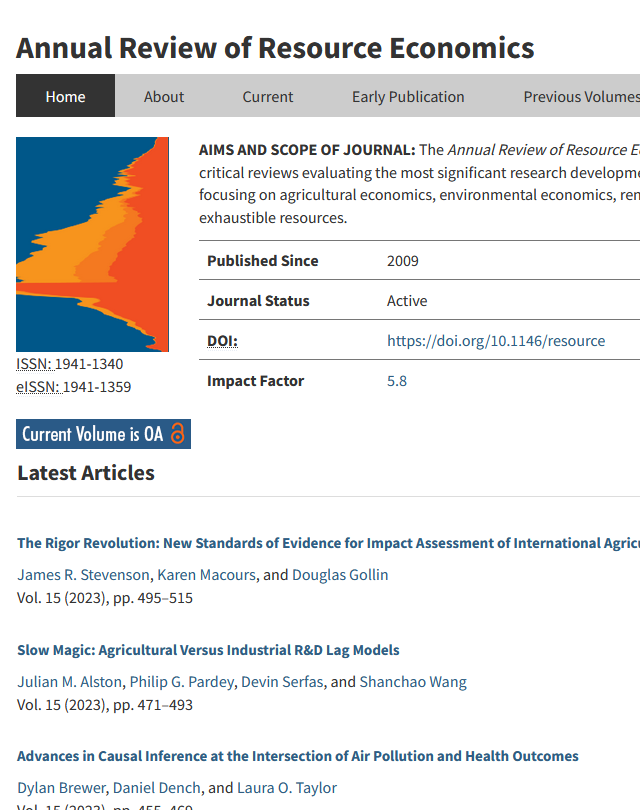Agricultural Trade and Environmental Sustainability
IF 4.2
2区 经济学
Q1 AGRICULTURAL ECONOMICS & POLICY
Annual Review of Resource Economics
Pub Date : 2021-06-25
DOI:10.1146/annurev-resource-101420-090453
引用次数: 11
Abstract
Global agriculture consumes substantial resources and produces significant pollution. By shifting its production to new locations, and inducing changes in technology and input use, trade has a substantial impact on environmental sustainability of the world's food systems, but due to suboptimal environmental policy, the exact nature of these impacts is in dispute. We review the literature on agricultural trade and environmental sustainability, highlighting the different approaches taken in ecology versus economics. While useful in identifying environmental costs, much of the ecological literature does not compare these costs to a trade-free counterfactual and can therefore be misleading. Further, by moving production to places with more resources and increasing production efficiency, trade can reduce the environmental impact of food production. On the other hand, trade can also limit the effectiveness of domestic environmental policy because production can be shifted to countries with less stringent regulations. However, recently, consumers are leveraging trade policy to induce exporters to improve environmental sustainability. While such policies are gaining traction in wealthy countries, evidence suggests that such measures will not reach their potential without buy-in from decision makers in the countries where the environmental damages are occurring. Expected final online publication date for the Annual Review of Resource Economics, Volume 13 is October 2021. Please see http://www.annualreviews.org/page/journal/pubdates for revised estimates.农业贸易与环境可持续性
全球农业消耗大量资源,产生严重污染。通过将其生产转移到新的地点,并引起技术和投入使用的变化,贸易对世界粮食系统的环境可持续性产生了重大影响,但由于次优的环境政策,这些影响的确切性质存在争议。我们回顾了有关农业贸易和环境可持续性的文献,强调了生态学与经济学所采用的不同方法。虽然在确定环境成本方面很有用,但许多生态文献并没有将这些成本与自由贸易的反事实进行比较,因此可能会产生误导。此外,通过将生产转移到资源更多的地方并提高生产效率,贸易可以减少粮食生产对环境的影响。另一方面,贸易也会限制国内环境政策的效力,因为生产可以转移到管制不那么严格的国家。然而,最近,消费者正在利用贸易政策促使出口商改善环境的可持续性。虽然这些政策在富裕国家越来越受欢迎,但有证据表明,如果没有环境损害发生国家决策者的支持,这些措施将无法发挥其潜力。《资源经济学年鉴》第13卷的最终在线出版日期预计为2021年10月。修订后的估计数请参阅http://www.annualreviews.org/page/journal/pubdates。
本文章由计算机程序翻译,如有差异,请以英文原文为准。
求助全文
约1分钟内获得全文
求助全文
来源期刊

Annual Review of Resource Economics
AGRICULTURAL ECONOMICS & POLICY-
CiteScore
9.40
自引率
0.00%
发文量
34
期刊介绍:
The Annual Review of Resource Economics provides authoritative critical reviews evaluating the most significant research developments in resource economics, focusing on agricultural economics, environmental economics, renewable resources, and exhaustible resources.
 求助内容:
求助内容: 应助结果提醒方式:
应助结果提醒方式:


